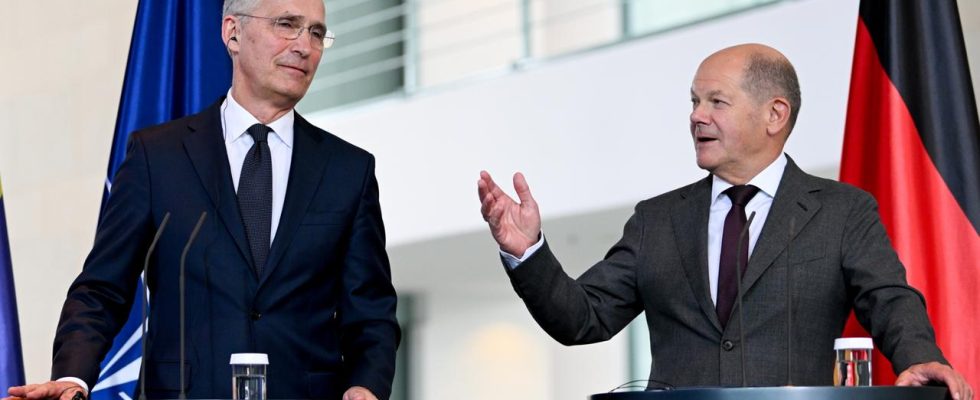While the budget negotiations are still ongoing, there is a discussion as to whether Germany will spend enough on defense in the future – and whether NATO’s two percent target can only be reached with a trick.
It doesn’t matter whether it’s within the NATO military alliance in Brussels or within the traffic light coalition in Berlin: money is a constant topic of conversation and sometimes a contentious issue, both here and there. As far as NATO is concerned, it was already planned in 2014 – shortly after Russia annexed Crimea – to spend two percent of economic output on defense. At the summit in Lithuania at the beginning of July, an even more ambitious goal will be formulated.
“With two percent of economic output as the lower limit – not as a cap,” as NATO Secretary General Jens Stoltenberg emphasized in Berlin. He took the opportunity to thank Chancellor Scholz for the national security strategy presented last week and praised Germany’s announcement as “historic” that it intends to achieve NATO’s two percent target from next year.
Special assets enable the step
Now, however, it is also true that the federal government is committed to the two percent in its security strategy. But it also makes it clear in the small print that it is aiming for this goal on an average over several years, leaving a back door open in the event that the two percent does not work out every single year.
“Because it can happen that you spend more in a year because of the orders – and then that balances out to a certain extent as a wave. But our perspective is the two percent,” explained Chancellor Olaf Scholz when asked. Anyone who listened closely here could definitely hear the subtle difference in Stoltenberg’s choice of words, who made it clear that from his point of view two percent is only the minimum of what he expects from the NATO countries.
In any case, Germany will only be able to achieve this NATO goal with the help of the 100 billion special fund. As far as the regular defense budget is concerned, department head Boris Pistorius had recently significantly reduced expectations of an increase. In any case, this should be well below the additional ten billion euros initially hoped for.
tough budget negotiations
Negotiations with Finance Minister Christian Lindner are still ongoing. Which is why Chancellor Scholz avoided the question today. He only emphasized once again that the two percent will be reached in the coming year. And then, turning to Stoltenberg, whom he uses on a first-name basis, he added: “Otherwise – if you don’t insist on copyright – I’ll adopt the Secretary General’s penultimate answer 100 percent.” – “No problem,” was Stoltenberg’s answer.
As a politician and Prime Minister of Norway, he had experienced for himself how difficult it was to increase defense spending. “If they spend more on defense, there is less for health, education and other essentials. But the truth is, in a more dangerous world, we cannot address issues like climate change and prosperity if we don’t have peace and security. ” This is how Stoltenberg argues. And maybe soon the Federal Chancellor. Which does not rule out that in Brussels, as in Berlin, there will continue to be a struggle for money.

